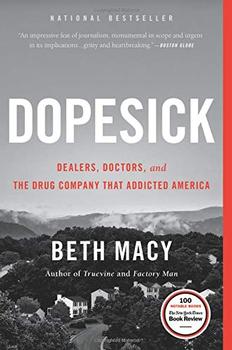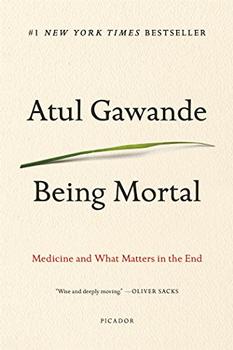Summary | Excerpt | Reviews | Beyond the book | Read-Alikes | Genres & Themes | Author Bio

A Physician's Quest to Transform Care Through the End of Life
by Ira ByockIf you are mortal or know someone who is, please read this hopeful primer on death and dying, pain and suffering, helplessness and responsibility, dignity, love, and life.
Through powerful and moving stories of his patients and friends, Dr. Ira Byock demonstrates how American attitudes toward death and current medical practices combine to isolate, humiliate, and inflict unnecessary pain and suffering upon the frail and the dying. Byock starts by diagnosing what ails the medical profession: a lack of training in end-of-life care, a focus on the pathology rather than the patient, and the proliferation of medical subspecialties, which, when patients are moved from one doctor to the next, fragments care. These practices push patients who would prefer to die in comfort and dignity at home into ICUs where they suffer the pain of unwanted and expensive medical procedures and are cut off from their helpless and frightened families.
Byock's specialty palliative care, seeks to change these practices by focusing on the easing of suffering and pain - for both the patient and for his loved ones: "Palliative care is an interdisciplinary team approach to care for people with life-threatening conditions, which addresses physical, emotional, social, and spiritual distress and seeks to improve the quality of life for the ill person and his or her family." This collaborative model treats the patient as a whole person and acknowledges the patient's values and wishes.
This team approach sounds expensive, but Byock repeatedly shows that palliative care teams (and hospice care) save money while profoundly improving quality of life for patients and their families. An example: It doesn't cost a thing for family members to bring photographs and music to the ICU. They comfort the patient and, importantly, help the medical staff get to know their patient, not just his or her disease.
Once palliative care doctors learn more about their charges, their teams determine how their patients would like to die. If a non-communicative patient has not prepared an advanced directive (and 75% of American adults have not), palliative care physicians meet with family members to determine the "goals of care." These goals can include anything from enlisting all available treatments to no treatment at all.
Byock recounts painful, angry and tragic meetings with confused and frightened families unaware of their loved one's wishes; they're so afraid of accepting the inevitable that they prolong useless, expensive and invasive treatments. But, Byock reminds the reader, no matter how much we avoid discussing it, "death is not optional." His stories of patients who died gently and well, and of the family members who helped them, show us that it is only when we accept mortality that we can, with our doctors' help, discover reasonable "goals of care." If not unlimited life, then quality of life for the remaining hours, days, weeks, months, or years.
Again, this "quality of care" sounds expensive but it saves money. Palliative care keeps seriously ill patients comfortable and as pain-free as possible and often allows them to remain at home where they can enjoy music, food, and the company of friends and pets. It also helps patients avoid treatments that prolong suffering and sometimes even shorten life, while guiding and supporting caregivers who are eager to demonstrate their love.
In this suspenseful, moving and indispensable book, Byock shares a great deal of important information: how palliative care and hospice care extend life rather than shorten it; why he thoroughly and adamantly opposes physician-assisted suicide; how families caring for frail and elderly relatives can advocate for them and help them remain independent and well; how to get the most from doctors' appointments; how to help a dying friend or relative; how a political movement to reform the way we die in America is overdue; and how medical professionals can love their patients.
I especially appreciate Byock's affectionate and optimistic view of human nature. He believes that caring for one another is essential to human character and that death, when done right, affirms love, heals loss and completes and enriches our lives:
Everyone dies of something. Every time a new complication develops, the doctors will assign it a name, giving you another diagnosis... Yet when someone's underlying illness is progressing or their general condition leaves them weak and with little chance of turning things around, every decision to treat a potentially lethal problem means the person will have to eventually succumb to something else. The question then becomes: What would be an acceptable way for you - or the person you love so much - to die.
![]() This review was originally published in The BookBrowse Review in April 2012, and has been updated for the
March 2013 edition.
Click here to go to this issue.
This review was originally published in The BookBrowse Review in April 2012, and has been updated for the
March 2013 edition.
Click here to go to this issue.

If you liked The Best Care Possible, try these:

by Beth Macy
Published 2019
The only book to fully chart the devastating opioid crisis in America: An unforgettable portrait of the families and first responders on the front lines, from a New York Times bestselling author and journalist who has lived through it.

by Atul Gawande
Published 2017
In Being Mortal, bestselling author Atul Gawande tackles the hardest challenge of his profession: how medicine can not only improve life but also the process of its ending
Your guide toexceptional books
BookBrowse seeks out and recommends the best in contemporary fiction and nonfiction—books that not only engage and entertain but also deepen our understanding of ourselves and the world around us.